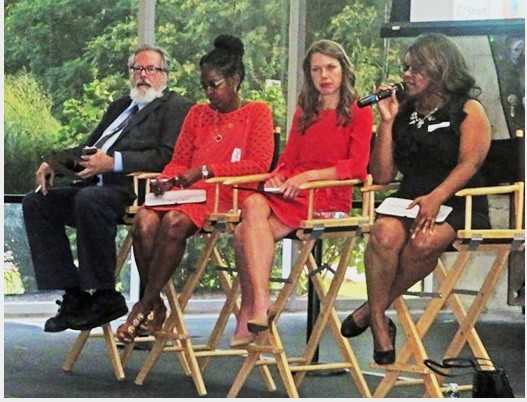I’ve watched every school board meeting since Dr. Marie Feagins was elected superintendent of Memphis-Shelby County Schools a year ago.
I’ve read the board’s resolution that terminated her contract last month, and the special counsel’s 209-page investigation of the board’s allegations against her.
I’ve read Feagins’ response to the allegations in her two-page email to board chair Joyce Dorse-Coleman on January 6th, and her 14-page “official response” to the board January 14th.
I’ve read Feagins’ startling allegations against the board in the 31-page lawsuit she filed in Shelby County Circuit Court earlier this month.
I’ve read every relevant public document and heard every public statement made by all parties involved in the latest disaster that has befallen our local public school system. And I’ve read news articles, opinion columns, politicians’ comments, and angry social media posts about the sordid mess.
I still don’t get it. I still don’t understand why Feagins was fired after less than a year on the job.

The three examples of “professional misconduct” the board leveled against her might have justified a public reprimand, but not a public execution. At best, as six-year board member Michelle McKissack argued, they reflect “growing pains” for a superintendent who started working in April and a board with four members elected in August. At worst, well, we don’t know.
In her recently filed lawsuit, Feagins paints a picture of school board members bowing to local political and financial interests and conspiring behind the scenes — in violation of the state’s open meetings law — to find reasons to fire her.
But board members who voted to fire her, and the special counsel’s January 21st report they relied on to do so, paint a very different picture, one of a renegade superintendent running roughshod over the district and making “false and/or misleading” statements to the board about her intentions and actions.
The public record so far, to say the least, is inconclusive.
The special counsel’s report concluded that Feagins “violated her employment contract no less than eight times and deviated from Board policy on at least nine occasions.”
Six of the nine alleged policy “deviations” pertained to a single board policy — 1013, or the Superintendent Code of Ethics. That three-page policy, approved in 2017, contains 15 “statements of standards” the superintendent must follow, including: “I will endeavor to fulfill my professional responsibilities with honesty and integrity.” Vague enough for you?
As for the eight alleged contract violations, all pertained to a single paragraph in her contract. “Ethical conduct: The superintendent in all aspects of her interactions and transactions related to carrying out her duties of superintendent, agrees to represent, enforce, and adhere to the highest ethical standards.” Whose ethical standards? Which ethical standards?
“I will point out,” McKissack wrote in a January 13th letter to the board, “that Superintendent Feagins is not accused of theft, fraud, or any criminal misconduct.” What she mostly is accused of is making “false and/or misleading” statements to the board about three allegations of “professional misconduct.” That covers 13 of the 17 alleged contract violations.
The four other “violations” were attributed to Feagins’ failure to provide a document or report to the board in a timely manner. Feagins said those failures were unintentional and the result of “staff oversights.” The public record seems to support her version.

The Termination Resolution
First, the termination resolution claims that Feagins “misled the board” about “overtime abuse” she brought to the board’s attention last July. “Dr. Feagins never presented any evidence suggesting that her statement was true, and she did not correct or clarify her statement to the public,” the board’s first allegation reads. But Feagins told the board last July and again in December and January that she based her comments on “documented fiscal reports” of overtime pay records for 2022, 2023, and 2024.
“I provided at least three years of data to the board,” Feagins said after hearing the charges against her read aloud at the December 17th special called meeting.
There are no records that the board ever asked for or reviewed the data or tried to substantiate Feagins’ claims about overtime abuse.
Second, the termination resolution claims that Feagins accepted and deposited in the district’s account a $45,000 donation to the district from the SchoolSeed Foundation “without Board approval.”
“At a [November 19th] Board Work Session, Dr. Feagins misrepresented her knowledge of and involvement in depositing the unapproved donation check in violation of Board Policy,” the board’s second allegation reads.
Feagins said she didn’t learn about the donation until November 8th, the result of “a staff oversight,” and “promptly submitted the donation to the Board” at its next meeting, November 19th. The board approved the donation December 3rd. Two weeks later, five board members used it to charge her with “professional misconduct.”
The special counsel’s report cites two emails Feagins sent to staff in July that “irrefutably establish” that she knew then about the check. But neither email mentions a $45,000 SchoolSeed check, which records show wasn’t received by the district until August 13th.
Third, the termination resolution claims that Feagins “was dishonest with the board and public” about missing a deadline for a $300,000 federal grant to help homeless students. Feagins acknowledged that her staff failed to meet the September 30th deadline, but said the state subsequently allowed the district to use the funds for various expenses related to helping homeless students. “We missed the deadline,” she told the board December 17th.
The board’s allegations and investigation do not say how much — if any — of the $300,000 grant (leftover Covid-relief funds) was used or forfeited. The special counsel’s report to the board states that Feagins’ comments about the grant were “only accurate to a degree, but not completely.” That could sum up the board’s allegations against Feagins: only accurate to a degree, but not completely.
“Clerical errors,” McKissack called them at the December 17th special board meeting. At least five board members at that meeting were clearly determined to fire Feagins. They didn’t explain why Feagins or board members in her corner didn’t see the resolution to fire her until a few minutes before the meeting. They didn’t respond to questions that Feagins or four other board members raised about the specific allegations in the resolution.

Missing Pieces
They did raise a slew of other issues that weren’t in the resolution or the special counsel’s report. Board member Sable Otey, elected August 1st, blamed Feagins for the suicidal thoughts of an educator in her district, and the firing of a teacher in her district. She also claimed teachers were texting her with complaints about the superintendent. She didn’t present any evidence of her claims, and they weren’t included in the resolution.

Board member Towanna Murphy, elected August 1st, blamed Feagins for the injury of a special needs child in her district, and for putting other special needs students at risk. She didn’t present any evidence of her claims, and they weren’t included in the resolution.

Board member Natalie McKinney, elected August 1st, accused Feagins of creating “a climate of fear and intimidation” in staff across the district. She didn’t present any evidence of her claims, and they weren’t included in the resolution.
Various board members blamed Feagins for the district’s problems receiving sufficient staff and materials for online learning, dual enrollment, remedial instruction, and student assessment. They didn’t present any evidence that Feagins was to blame for those problems, and those complaints weren’t included in the termination resolution.

Board member Amber Huett-Garcia, who voted not to fire Feagins, said many of the complaints were “highlighting the woes of a district that is under-resourced [with] generational challenges” that began decades before Feagins arrived.
McKinney pushed back. “Our [board] seats have given us a bird’s-eye view of the working of the district,” McKinney said. “We see things the general public does not see.”
The general public still is not seeing those things. The superintendent works for the board, but the board works for the public. The board owes the public — not to mention Feagins, her staff, teachers and parents, and other public officials — a thorough, clear, compelling, and public explanation for why she was fired.
There was a fourth and final accusation in the termination resolution: “The board has also become aware of certain patterns of behavior by Dr. Feagins that are not conducive to the effective operation of the District in the best interests of students, including but not limited to her refusal to communicate and/or cooperate with valued District partners.”
That accusation was not included in the 209-page investigation, nor in the list of 17 alleged contract or policy violations. But I suspect it probably comes closest to explaining what went wrong. Feagins could be prickly, curt, and dismissive, even in public board meetings, in stark contrast to her predecessor Joris Ray, who resigned under a cloud in 2022.
A Direct Approach
At board meetings, Ray was unfailingly polite and solicitous, usually thanking board members profusely and formally by title and name for every question. His staff members did the same. Ray began meetings by asking his staff to join him in reciting the district’s motto: “Together we must believe. Together we can achieve. Together we are reimagining 901.”
Feagins didn’t have a motto or lead a cheer. Her responses to board members’ questions were more direct and could include a cold stare or a disdainful “for the record” or “let the record show.”
I suspect that Feagins was fired because a majority of board members didn’t like her, didn’t like how she was managing the district, and were getting complaints from central staff administrators, principals, local nonprofit leaders, and favored local contractors.
They were being told that Feagins was moving too fast and going too far and stepping on too many toes in her efforts to restructure the top-heavy district to address the loss of Covid funding and to give classroom teachers more support and more authority. But that’s just speculation. Just about everything you’ve read or heard about why Feagins was fired is speculation.
Feagins has called the allegations against her “meritless and baseless.” Earlier this month, she sued the school board and asked the court to void the board’s 6-3 vote to fire her.
In the lawsuit, Feagins claims that Althea Greene, Dorse-Coleman, and several other board members violated the state’s open meetings law by meeting secretly beginning in August to plan ways to terminate her contract.
It’s likely the litigation will end with a quiet, off-the-record settlement much like Ray’s agreement to resign in 2022. Which means the public may never know exactly why Feagins was fired.
What’s Next?
So now the school board is at odds and searching for its sixth superintendent since the 2013 merger upended the entire system. The Shelby County Commission has ordered a forensic audit of the school district’s budget. The state is threatening to take over the school board. State Representative Mark White (R-Memphis) plans to introduce legislation to create a new nine-member board that would oversee the local board. “This would be a management intervention,” White told Chalkbeat Tennessee.
Public education is under duress. The governor plans to spend nearly half a billion dollars a year offering private school vouchers to high-income parents. The Trump administration is prioritizing private “school choice” funding and gutting the U.S. Department of Education. Public schools are preparing for massive safety net cuts and immigration raids and conducting regular “active shooter drills.”
Meanwhile, schools and teachers continue to try to address the academic, social, and emotional needs of students traumatized by poverty, community violence, school shootings, and the pandemic. And constant political turmoil.
David Waters, a veteran journalist, has covered public education in Memphis and Tennessee off and on for 30 years. He is associate director of the Institute for Public Service Reporting at the University of Memphis.


 JB
JB  JB
JB